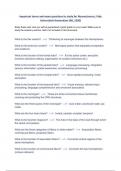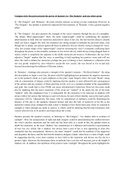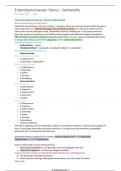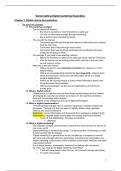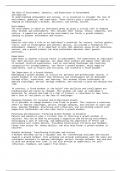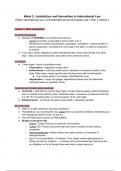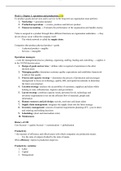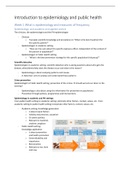When we hear the word elite, its often taken up in a lot of different ways.
We can look at how different strategies are associated with protecting their wealth.
What industries have emerged to protect people’s wealth.
We can also see how this force is taken up in other ways. For example, the Harvey Weinstein
scandal, where he was guilty of using his power in order to sexually assault over 50 women and
at the time a number of stories highlighted the complicity of Hollywood elite here who knew
what was going on but didn’t say anything. It was an industry that was protecting him.
While elites are often discussed in a popular culture, it can have very different connotations. A
great example of that is with the last US election. Kamala Harris on one side and Donald Trump
on the other. We can see how different kinds of usages of the word elite were mobilized against
both of them.
Very different connotations:
-Right: associates the elite with Professional, political cultural power and its associated with
where you’ve gone to school, what kind of credentials do you have and how embedded you are
in political, social and cultural institutions.
-Left: elite is associated more as a tiny class, who has come to acquire a growing share of the
world’s wealth.
While there are a lot of issues on the table during the election. There was a lot of different
things that people were concerned about. The language of the elite and how it was framed was
in part decisive in framing the outcome of the election. And we can see how similar kind of
discourse has now been mobilized in Canada. With the conservative recently targeting the
elitism of the liberals.
We can look here at how Poilievre and the conservatives are also trying to take this discourse
and mobilize it in Canada. And at the same time we can see that while the conservatives are
framing themselves as a working class party if you actually look at the composition of the
national console, over half of the console is made out of lobbyists from big oil companies,
pharmaceutical companies, corporate landlord associations and business associations that are
actively working to decrease the minimum wage of poor working class people.
You could question to what extent Poilievre is really standing for the working class.
Its interesting to follow this because in many ways it kind of speaks to how our conception of
our elites are changing and in this class our teacher wants to go beyond the pop culture kind of
references to elites to look at how elites are taken up as sociological objects of analysis. And he
wants to touch on the ebullience that the word elite has in sociological research and discuss
, how does ebullience might be reflective of how elites have been changing over the past three
decades.
Part 1: Neo-Marxist critiques of the elite and focus on C. Wright Mills and his book “The Power
Elite” that really kind of gave rise to this emergence of this whole realm of study in the 60s and
70s. Mills was really central to interrogating the formation of what came to be known as the
Military Industrial Complex in America. In this analysis, Mills adopted a vision of elites as
occupying key what he called command posts at the national level which cut across the realm of
politics, economy, and the military. He discussed how those who occupied these command
posts came from a calm background, going to the same schools, going to the same clubs.
He'll begin by talking about how these concepts have been taken up by a lot of sociologists in
looking a the nature of the composition of elites over the past 50 years.
Part 2: And then he wants to talk about how well this model holds up today and he wants to talk
about the growing kind of temporary literature on elite theory of how in some points this stays
true to what Mills was trying to do but in other ways it’s kind of parting ways.
Along these lines we can ask to what extent does it make sense to talk about national elites
anymore. Does elite power continue to be organized through organizational pyramids at the
national level or have elites come to adopt different ways of moving through institutions that
across markets.
To get started with part 1: First of all, its important to know that the discussion of elites is not a
new thing. It has been around for a long time even prior to Mills, there was a number of people
associated with sociology that have come to argue that power in our society is concentrated in
the hands of a small group of people. Probably what first comes to mind is that Carl Marx who
studied a class power in the economic realm through the private ownership of the means of
production. Marx goes on to argue that those who own the means of production also are able
to have control in the political realm, the cultural realm, etc.. It’s also taken up by a number of
social scientists informed by work of varying perspectives informed by Max Weber. This
sociologist explored how individuals attain positions of power through their command over
institutions. For instance, a very famous sociological study in 1911, Robert Michel wrote “The
Iron Law of Oligarchy” arguing in every organization whether it be a political part, a professional
union or any other association of the kind. The aristocratic tendency manifest this very clearly.
The mechanism of the organization law could bring a solidity of structure and use a serious chap
changes in the organized mass, completely inverting the respective position of the leaders and
led with advance of organization democracy tends to decline. Democratic evolution has a
parabolic course at the present time at any rate as far as party life is concerned, democracy is in
the descending phase.
Michel was central in predicting the increasing concentration of power through bureaucratic
forms of the organization in the modern era. And with the formation of the mass institutions
like political parties, multinational corporations, incorporating thousands of people he notes,
there was a tendency for power to become increasingly concentrated at the top. This is what he


